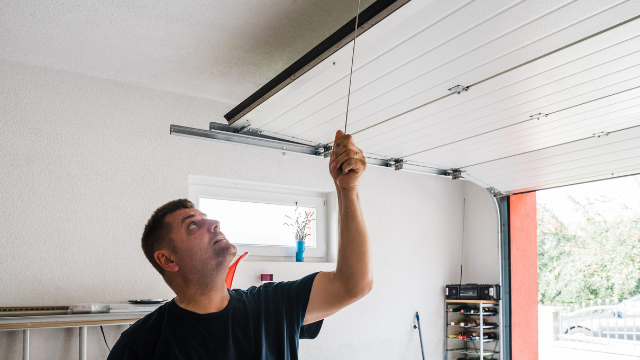Are you wondering how big garage doors can be? Well, you’re in the right place! In this article, we’ll provide you with all the essential information about the different sizes of garage doors. Whether you have a single-car garage, a double-car garage, or even an oversized garage, we’ve got you covered. We’ll also discuss custom garage door sizes and the factors you should consider when choosing the right size for your needs. So, let’s dive in and find the perfect fit for your garage!
Single-Car Garage Door Sizes
If you have a single car garage, you might be wondering about the size of the garage door you need. Standard garage door sizes for single-car garages typically range from 8 feet to 9 feet wide and 7 feet to 8 feet tall. These dimensions allow enough space for most cars to enter and exit the garage comfortably.
The most common garage door dimensions for a single-car garage are 8 feet wide by 7 feet tall. This size can accommodate most cars and provides ample clearance for entry and exit. However, if you have a larger vehicle or additional storage needs, you may want to consider a wider or taller garage door.
Garage door sizes can also vary depending on the type of door you choose. For example, sectional garage doors are commonly available in standard sizes, while custom-made doors can be tailored to fit your specific requirements.
When selecting the size of your garage door, it is essential to consider the dimensions of your garage, the type of vehicle you own, and any future needs or additions. Consulting with a professional garage door installer can ensure that you choose the right size door for your single-car garage.
Double-Car Garage Door Sizes
When choosing a double-car garage door, it is important to consider the size options available. Double-car garage doors come in both standard and non-standard sizes, depending on the specific needs of your garage. Here are four key points to keep in mind:
- Standard vs. non-standard double-car garage door sizes: Standard double-car garage doors typically measure 16 feet wide by 7 feet high. However, if you have larger vehicles or require more space, non-standard sizes are available, ranging from 18 to 24 feet wide and 7 to 8 feet high.
- Common materials used for double-car garage doors: Double-car garage doors can be constructed from various materials, including steel, wood, aluminum, and fiberglass. Steel doors offer durability and security, while wood doors provide a traditional and elegant look. Aluminum and fiberglass doors are lightweight and low-maintenance options.
- Insulation options: To improve energy efficiency and temperature control in your garage, consider an insulated double-car garage door. Insulation materials such as polystyrene or polyurethane foam can help regulate the temperature and reduce noise transmission.
- Customization options: Double-car garage doors can be customized to match your home’s style and aesthetics. You can choose from a variety of designs, colors, and finishes to create a cohesive and visually appealing look.
Oversized Garage Door Sizes
You can choose an oversized garage door to accommodate larger vehicles and provide additional space in your garage. Oversized garage doors are typically used in commercial settings where larger vehicles such as trucks and delivery vans need to enter and exit the premises. These doors are also popular among homeowners who want to store recreational vehicles like boats and RVs in their garages.
When it comes to commercial garage door sizes, there are regulations in place to ensure safety and functionality. The International Building Code (IBC) sets guidelines for garage door sizes in commercial buildings. According to the IBC, the minimum width for a commercial garage door is 8 feet, while the minimum height is 7 feet. However, these dimensions may vary depending on the specific application and local building codes.
To give you an idea of the range of sizes available, here is a table showcasing common commercial garage door sizes:
| Door Width (feet) | Door Height (feet) | Application |
|---|---|---|
| 8 | 7 | Small delivery trucks |
| 10 | 8 | Delivery vans |
| 12 | 10 | Large trucks |
It’s important to consult with a professional garage door installer to determine the appropriate size for your specific needs and to ensure compliance with local regulations.
Custom Garage Door Sizes
Looking for a garage door that is tailored to your exact specifications? Custom garage door installation offers a range of benefits that can enhance the functionality and aesthetic appeal of your garage. Here are four reasons why opting for a custom garage door is a wise choice:
- Perfect fit: Custom garage doors are built to fit the exact measurements of your garage opening. This ensures a seamless and precise installation, eliminating any gaps or unevenness.
- Unique design: With a custom garage door, you have the freedom to choose from a wide range of design options. Whether you prefer a traditional style or a more modern look, you can create a door that complements your home’s architecture and reflects your personal taste.
- Increased security: Custom garage doors can be equipped with advanced security features, such as reinforced materials, tamper-resistant locks, and smart technology. These enhancements provide an added layer of protection for your belongings and peace of mind for you and your family.
- Improved energy efficiency: Custom garage doors can be insulated to minimize heat transfer and reduce energy loss. This can help keep your garage temperature regulated, saving you money on heating and cooling costs.
Investing in a custom garage door installation not only enhances the functionality and aesthetics of your garage but also offers added security and energy efficiency benefits.
Factors to Consider When Choosing the Right Size
To choose the right size for your garage door, consider the factors that will best suit your needs. Avoiding common mistakes when selecting garage door sizes is crucial to ensure a seamless installation process and optimal functionality. One common mistake is underestimating the required width of the door. It’s important to leave enough space for your vehicle to comfortably enter and exit the garage. Another mistake is neglecting to account for the height of your vehicle. Take into consideration any roof racks or antennas that may add extra height.
To measure your garage for the perfect door size, start by measuring the width and height of the opening. Use a tape measure to determine the precise dimensions. Measure the width at the widest point of the opening, and the height from the floor to the top of the opening. Additionally, consider the headroom, which is the distance between the top of the door opening and the ceiling. This measurement is important to ensure there is enough space for the door to fully open without obstruction.






